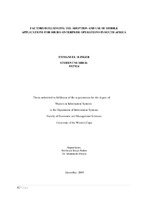| dc.description.abstract | The micro-enterprise sector, although associated with mostly informal businesses, shows promise of potential and transitioning to more formal businesses. With this in mind, the South African government recognizes that prioritized sectorial development is needed to stimulate growth particularly in the micro-enterprise sector. Considering that evidence reveals growth and development in small business practices being closely related to the use of different forms of Information and Communication Technologies (ICTs), if and when strategically applied. Therefore recognizing the importance of ICTs the South African government has embarked on various technology related initiatives to facilitate needed growth and development. Despite this, entrepreneurs in the micro-enterprise sector demonstrate a low uptake of ICTs for their business operations, including the use of mobile technologies which are the most common form of ICTs available to micro- entrepreneurs.
Many previous studies have investigated the adoption and use of mobile technologies in the micro- enterprise sector, but despite this a low uptake of mobile technologies still exists. For this reason, this study investigates and empirically determines the factors influencing the adoption and use of mobile applications for micro-enterprise operations in South Africa, using the Unified Theory of Acceptance and Use of Technology (UTAUT) model as a lens. The research population comprised a group of micro-entrepreneurs who all are users of a common mobile application (mentorship-movement application). The main aim of the investigation was to determine (i) the factors influencing the adoption and use of mobile applications for micro- enterprise operation, (ii) if the experience gained and their satisfaction associated with using the mentorship-movement application will influence their behavioural intention to use other mobile applications for business.
The study was conducted objectively and used hypothesis testing as the means of investigation. Data was collected through the use of a survey questionnaire. The findings of the study indicate that performance expectancy and effort expectancy positively influences the micro-entrepreneurs behavioural intention to adopt and use mobile applications for micro-enterprise operations. The findings also observed that social influence has no impact on the micro-entrepreneurs’ behavioural intention to adopt and use mobile applications for business. Facilitating conditions and behavioural intention were found to positively influence the use behaviour of the micro-entrepreneurs when it comes to adoption and use of mobile applications for business. Moreover, the findings confirmed that experience and satisfaction in using one mobile application does not influence the behavioural intention of the micro-entrepreneurs to use other mobile applications for business.
The factors which have been found to bear influence on the adoption and use of mobile applications amongst micro-entrepreneurs in South Africa have implications for both policy and practice. In particular, the findings of this study may be used to inform the design of the various programmatic interventions which seek to improve outcomes of the micro-entrepreneur sector. This includes interventions by the Department of Small Business Development and that of the Small Enterprise Development Agency (SEDA). | en_US |

